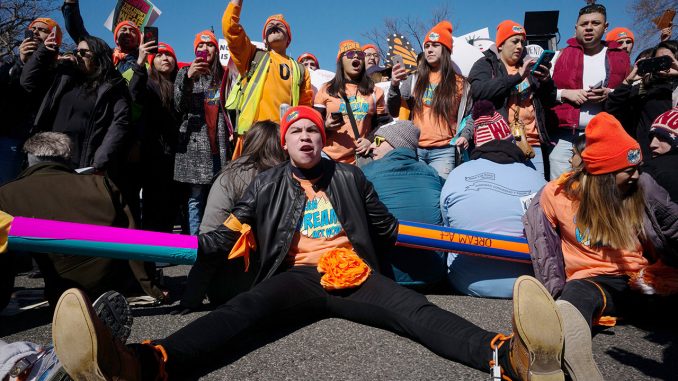
During Tyler Lum’s spring break, he spent a night in jail.
Lum, a sophomore political science major, was arrested with an estimated 80 other people during protests in Washington, D.C. in front of the Capitol Building. The protests were against President Donald Trump’s repeal of the Deferred Action for Childhood Arrivals — most often referred to as DACA — in September 2017.
This semester, he ran for student body president on the VoiceTU ticket, which lost to IgniteTU last week.
DACA, an executive order by former President Barack Obama, protects immigrant children who came to the United States without documentation. It allows them to renew their legal status every two years to avoid deportation and to receive work permits.
Lum began participating in protests for Dreamers, the group of people protected by DACA, in December 2017, but became aware of the issue in September when Trump rescinded the program. Trump gave Congress until March 5 to find a solution, but this was unsuccessful. Two federal court orders in January and February allowed DACA recipients to apply for two-year renewals of their permits again.
Lum came to the U.S. from Malaysia when he was 7 years old. His mother is a U.S. citizen, so he was automatically granted citizenship.
“Growing up with the understanding of the immigrant story, and the idea that there is the American dream still out there, I think is definitely something that ties into why I was so passionate about the issue,” Lum said.
When DACA was rescinded, Lum, who is TSG’s director of government affairs, said TSG worked to find resources for students at Temple who may have been affected, whether it was legal help or counseling.
“We were trying to figure out if there was a way to help out with the tuition for these students, because if they lose their status they struggle with trying to pay for schooling,” Lum said.
Lum first made the trip to Washington, D.C., in December with Student Body President Tyrell Mann-Barnes. They both assumed it was for an academic conference, because Mann-Barnes had met the organizer the summer before at a leadership conference.
When they arrived at the church, they realized that United We Dream was a grassroots organization, and they would be doing more than learning about activism.
While in Washington, D.C., Lum participated in political sit-ins, which are protests where demonstrators take over a space.
The goal of each sit-in was to gain media attention and put pressure on elected officials by occupying their offices.
“Whenever you occupy their office, not only does it disrupt what they are trying to do, but if they are trying to come off to the media as people who are friendly to undocumented people, they don’t want to call the Capitol Police on you,” Lum said. “It puts them in a very weird position when you shut down their office and…they have to make a decision of how much they are going to tolerate the people.”
During the office sit-ins, the group would sing songs and chant, “Undocumented, unafraid” and “Up, up with liberation, down, down with deportation,” in order to share their message and comfort the undocumented people who were telling their stories.
When Lum returned to Washington, D.C., with United We Dream in March, he was asked by group members if he was willing to get arrested.
“As somebody who is in this country with a certain level of privilege, I think that the very least I can do is speak up and say something,” Lum said. “If that includes me being arrested, if that’s what the community feels is necessary for the movement, then I think that’s something I can easily contribute.”
In March, Lum protested with the group outside the Capitol Building. The group shut down an intersection of New Jersey and Independence avenues by tying group members together with PVC piping, chains and clips.
When the police arrived, all of the members that were chained to each other, including Lum, were charged with resisting arrest. Lum spent the night in a jail cell with nearly 30 people who were involved in the protest.
“That was a really eye-opening moment for me, because I saw how poorly they treat people within a jail,” Lum said. “It’s very much the same way that they treat a lot of immigrants at detention centers, whenever they are going to be deported.”
Mann-Barnes said he learned how to use his own privilege to empower undocumented people through Lum’s activism.
“I really admire the work that Tyler does, and how he does it selflessly,” Mann-Barnes said. “I think it’s important that when people traditionally have privilege or some type of power, that they not only use it to help elevate other people, but they are also willing to give it up to be sure that people all have equal rights in general, and I just adore that so much and I do applaud him for his work.”
Lum has not been contacted by the organization since the protests in March, but he hopes to stay involved with DACA protests.
“If you asked me four months ago if I would have have gotten arrested, gone to jail and missed school so much, I would have thought you were crazy,” Lum said. “But sometimes whenever you meet a cause that you really care about, it’s worth it, and I would go back down in a heartbeat.”


Be the first to comment